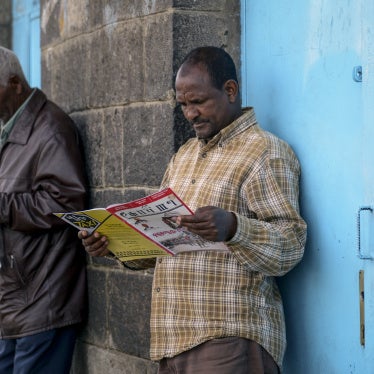The ousting of 22 National Assembly members, following a Constitutional Court decision that they could not sit as “independents,” raises serious concerns about double standards given that other independent deputies supporting the government remain in parliament, Human Rights Watch said today. The affected parliamentarians had been elected as members of the ruling National Council for the Defense of Democracy-Forces for the Defense of Democracy (Conseil national pour la défense de la démocratie-Forces pour la défense de la démocratie, CNDD-FDD), but had left or been expelled from the party following internal divisions.
“The CNDD-FDD is trying to pull a fast move to halt the erosion of its power in parliament,” said Alison Des Forges, senior adviser to Human Rights Watch’s Africa division. “The court’s endorsement of this move sets a dangerous precedent for future political life, raising fears among Burundians that basic political rights can arbitrarily be stripped away.”
The CNDD-FDD, a former rebel movement that became a political party in 2003, handily won elections in 2005. In accordance with a system of proportional representation set out in the constitution and electoral law, CNDD-FDD won the majority of the seats in the National Assembly. Factional struggle split the party in 2007 with a score of assembly members withdrawing from its ranks. In addition, former First Vice-president of the National Assembly Alice Nzomukunda was expelled from the party in 2008.
With the defection of 22 members, the CNDD-FDD could no longer control the National Assembly, leaving the body so paralyzed that it failed to pass a single law during its recent three-month session. At the request of CNDD-FDD leader Jérémie Ngendakumana, National Assembly president Pie Ntavyohanyuma, also a CNDD-FDD member, asked the Constitutional Court in a letter dated May 30 to determine whether persons who had left the CNDD-FDD could continue to sit as members of the National Assembly.
After less than two days of deliberation – with unprecedented speed, according to Burundian magistrates – the Constitutional Court ruled on June 6 that the former party members were occupying their seats in violation of the constitution. The court based its decision largely on its interpretation of article 169 of the constitution, which provides that candidates “cannot be elected and sit in the National Assembly” unless their party has received at least 2 percent of the popular vote. Because “independents” did not win more than 2 percent of the vote in 2005, non-aligned parliamentarians such as the 22 former CNDD-FDD members could not remain in the assembly.
The 22 deputies were not the first to leave their parties, but were the first to be expelled from Parliament as a result. In March 2008, when the opposition party Front for Democracy in Burundi (Front pour la Démocratie au Burundi, Frodebu) expelled several of its members who were closely aligned with CNDD-FDD, they were allowed to keep their assembly seats. Constitutional and electoral law specify that parliamentarians may lose their seats through death, resignation, permanent incapacity, unjustified absences, or a prison sentence of more than 12 months, but there is no explicit provision for expulsion following changes in political party membership. When the constitution was being written, drafters considered but rejected a provision that would have ousted assembly members who changed party affiliation. Many Burundian jurists interpret article 169 as applicable only during an election.
When parliamentarians were expelled from Frodebu, Assembly President Ntavyohanyuma made no request for the court to examine their status. Nor did he mention them in his May 30 letter, although the logic of the letter would suggest they had been occupying their seats unconstitutionally for months. Following the court’s decision, the chairman of Frodebu asked the assembly president on June 9 to submit the question to the court, but as of June 16, Ntavyohanyuma had not responded to his request.
Burundian jurists, members of opposition parties, representatives of civil society, religious leaders, and the Bashingantahe (a council of respected elders), criticized the court’s decision as a deliberate and politically influenced interpretation of the constitution which could lead to future rights violations. One of the expelled representatives told Human Rights Watch, “You lose everything, you lose the whole country if you start violating the constitution.” Critics suggested that National Assembly President Ntavyohanyuma’s obvious partiality in calling for the expulsion of renegade deputies was part of a CNDD-FDD strategy to hang onto power in order to be well-placed for elections scheduled for 2010.
Several Burundian lawyers and rights activists questioned why the diplomatic community had not commented on the decision. One lawyer told Human Rights Watch, “Everyone is afraid of 2010. If the CNDD-FDD sees that they can violate the constitution and the diplomats remain silent, they can do whatever they want to stay in power. We fear a repeat of Kenya or Zimbabwe.”
The court decision cannot be appealed, but in a similar previous case, the president of the National Assembly reinstated expelled deputies.
“The CNDD-FDD should reconsider this effort to edge out its competitors,” said Des Forges. “Party leaders should encourage the assembly president to use his authority to bring the dissidents back to the chamber and start addressing the pressing problems of the people of Burundi.”








